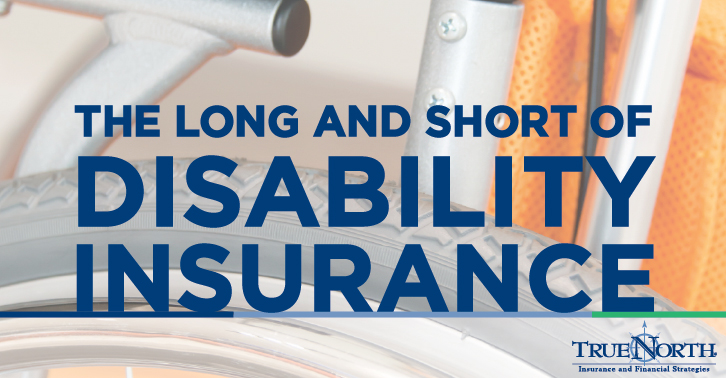The Long and Short of Disability Insurance
posted by TrueNorth Employee Benefits on Tuesday, May 10, 2016

For working individuals, a disability is a medical condition that reduces your ability to perform your job duties, usually an injury or illness. While some disabilities are work-related, nearly 75% of disabling injuries to workers occur off the job.
Disability insurance is coverage that provides you with income protections, should you lose time on the job due to an injury or illness. With disability coverage, you are compensated for a portion of your lost income.
What is Short-term Disability Insurance?
Short-term Disability Insurance (STD) is a type of disability insurance coverage that can help you remain financially stable should you become injured or ill and cannot work. Usually, STD coverage begins within one to 15 days of the event causing your disability. The coverage allows you to continue to receive pay at a fixed weekly amount or set a percentage of your income.
Short-term Disability typically lasts for about 10 to 26 weeks, although this varies by policy. When Short-term Disability coverage ends, long-term disability (LTD) coverage typically takes effect.
What is Long-term Disability Insurance?
Long-term Disability (LTD) is a type of disability insurance coverage that pays employees a set percentage of their regular income after a specified waiting period. For example, if a worker is covered under short-term disability (STD) insurance as well, the LTD insurance would kick in once the STD policy is exhausted, typically after three to six months.
LTD insurance protects workers in the event that they become disabled for a prolonged period prior to retirement. LTD policies are often offered through employers as part of a standard benefits package.
The length of LTD plans varies; some may be limited to a period between two and 10 years, while other plans continue paying out until age 65.
Why is Disability Insurance So Important?
The risk of disability is greater than most employees realize. When you become disabled and lose time at work, your source of income is eliminated. Nearly one-third of employees will miss more than one month of pay due to injury or illness. In addition to lost income, you are most likely experiencing an increase in medical expenses due to your disabling injury or illness.
What is Supplemental Disability Insurance?
Traditional medical insurance doesn't cover every expense related to an injury or illness. Bills and expenses can continue to add up, especially if you have to stop working for a period of time and lose your income. Supplemental insurance is additional coverage that can help you pay deductibles or copayments and other increasing medical costs not covered by your employer-sponsored insurance plan.
If you decide that the coverage offered through your employer-sponsored group plan does not adequately fill your personal needs, you should contact an independent agent or carrier.
How TrueNorth Can Help
TrueNorth offers businesses of every size comprehensive solutions to meet their business needs, as well as those of their employees. and takes pride in making sure that employees feel confident and informed in their benefit plan options and choices. If you are in need of business solutions or are looking to start a business of your own, please call TrueNorth. Our Employee Benefits division would be happy to assist you in providing the well-being of both you and your staff. Call us today at 1-800-798-4080.
About Author
TrueNorth offers businesses of every size comprehensive solutions to meet their business needs and those of their employees. If you are in need of business solutions and are looking for ways to protect and maximize your workforce, look to TrueNorth. Our Employee Benefits Division can assist you in providing for the well-being of both you and your staff. Call us today at 1-800-798-4080.
... read more about author